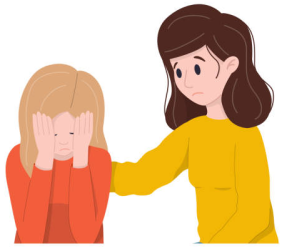Domestic violence, also known as intimate partner violence or domestic abuse, is a pattern of behavior in which one partner attempts to exert power and control over another partner in an intimate relationship through physical, emotional, or psychological means.
How Does Domestic Violence Impact Victims?
Domestic violence has great emotional disarray and profound psychological effects, which immensely impact its victims emotionally, psychologically, and even physically. Here’s how it affects victims:
- Sudden lack of feeling safe: domestic violence transpires a sense of psychological and emotional trauma in victims engaging them in indescribable fear and invoking actual fear of encountering their abusers physically or otherwise. Feeling safe and the assurance of protection and security usually becomes an apparent issue.
- Low self-esteem and confidence: The humiliation, manipulation, and various forms of abuse perpetrated by abusers can contribute to feelings of worthlessness, loss of or decreased self-worth or esteem lowered, personal importance, or general self-identity.
- Anxiety, depression, or PTSD: Victims of domestic violence sustain an aggressive, controlling, and abusive relationship. Accepting physical, verbal, or emotional abuse can trigger symptoms of post-traumatic stress disorder, anxiety, depression, or heightened stress.
- Impact on Personal and Family Relationships: Domestic violence destructs the entire family setup, leaving lasting psychological implications for concerned members, including a negative impact on trust, respect, communication, commitments, and taking initiative. They are also enforced social isolation, and communal rejection due to the stigma towards domestic abuse cases.
- Increase in Substance Abuse and Adjustment Issues: Instances of domestic violence create copious amounts of setbacks from initiating otherwise beneficial and positive endeavors such as sobriety groups. Quite commonly domestic violence inspires health conflicts that consume the victim’s emotional, psychological, or physical resources for adjustment complications.
How Does Domestic Violence Impact The Abuser?
Domestic violence not only impacts the victim but also has profound effects on the abuser. It can lead to a range of negative emotional, psychological and physical consequences, including:
- Anger Issues: Carrying too much anger towards a partner while switching to violent acts of intervention can develop debilitating and unhealthy emotions in the abuser.
- Self-Blame: Often despite knowing the toxic behavior is real, abusers tend to displace the blame from themselves by blaming the victim or a factor they cannot control— other people, environments relationships or societal/political factors, etc.
- Restored Impulsivity And Aggressive Behavior: Acting impulsively through violence, the determination to maintain power or status through violence also facilitates reactive behavior and aggression excess, and this will start to stop being condemnatory for fear of a response occurrence.
- Substance Abuse Problem: Not only do victims of domestic violence escalate the possibility of substance abuse in their future as noted earlier, but abusive partners also often become mistreated; seeking, perpetuating intellectualizing their behavior, they lose control or devaluation in the relationships with the common personality problem’s inner or long term psychological behavioral conflict development.
- Social Alienation: Nancials restrictions, legal conflicts, and psychological impacts of high-risk behaviors and suppression lead to social impact wherein close acquaintances or society as a larger engage in social rejection lawlessness changing the relationship status in their community, by-passing or severing social relationships.
- Incarceration: In some cases, domestic violence leads to legal complications and potential prison for abusers suffering from repeat offenses.
Now more than ever, it is crucial to stand behind positive relationship patterns and behavioral approaches while making conversant support services more available to help the victim and abuser rebuild their views on relationships across all documented programs. Safer communities and relationships can enhance personal livelihoods and society’s governing abilities to defuse problematic conflict obligations otherwise created.
Resolving is a long-feel process, building an active support service network and creating smooth access to physical or mental health resources can promote healing and foster positive outcomes to support group and community awareness. Understanding the severity and longevity of traumatizing victims deeply instigate validated structural change forecasts for less obvious issues affecting society at large.
Domestic violence can take many forms, including physical violence, sexual abuse, emotional or psychological abuse, financial abuse, and coercive control. Victims of domestic violence often experience a wide range of negative effects, including physical injuries, depression, anxiety, post-traumatic stress disorder (PTSD), impaired self-worth, and a general sense of fear and insecurity. This impact is especially true concerning children who witness or are directly impacted by the abuse. The victim often feels trapped, embarrassed, and ashamed. They may also experience isolation from family and friends, making it difficult for them to leave the situation.
The abuser may also experience negative consequences as a result of their behavior, including social isolation, legal repercussions, and damage to their relationships with children, family members, and other loved ones. The abuser may also feel guilty and struggle with low self-esteem.
It is important to note that domestic violence is a severe issue that cannot be dismissed by saying, “it was just a mistake.” Domestic violence is not the result of an individual’s lack of self-control but in many cases is systematic manipulation, coercion, and violence. Invariably, it is unacceptable and illegal.
Domestic violence is a dangerous issue, and if you or someone you know is experiencing abusive behavior, seek help immediately. There are many resources available to victims, including hotlines, shelters, legal aid services, and counseling services that can provide emotional support and assistance for both victims and abusers. Remember, domestic violence is never acceptable, and everyone deserves to live in a home environment that is free from violence and fear.






